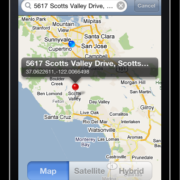Using LINQ to Objetcs in Delphi Prism
![]() During the last 10 year languages, frameworks and development platforms became better and better, we know many of this improvement, but in my opinion LINQ is one of the biggest innovations in the last 10 years.
During the last 10 year languages, frameworks and development platforms became better and better, we know many of this improvement, but in my opinion LINQ is one of the biggest innovations in the last 10 years.
LINQ is a set of extensions to the .NET Framework that encompass language-integrated query, set, and transform operations. It extends all .NET Language like Delphi Prism with native language syntax for queries and provides class libraries to take advantage of these capabilities
There are many ways to use LINQ, querying objects, XML and database, there are other implementations which allow you to query other artifacts.
To start to understanding LINQ, I will exemplify the use of LINQ to Objects querying a list of objects.
The source code used in this post is part of the Delphi Prism demos, folder Linq under Delphi Prism demos. I developed these samples and later we added to the product.
The following example shows a simple query over an Array of String.
type
Words = public class
private
words : Array of String := ['hello', 'Delphi Prism', 'wonderful', 'linq', 'beautiful', 'world' ];
public
method SimpleSelect;
method ComplexSelect;
end;
The following code shows the implementation for the methos SimpleSelect using LINQ to return a list of words whose length is less than or equal to five characters.
implementation
method Words.SimpleSelect;
begin
var shortwords := From word in words
Where word.Length <= 5
Select word;
Console.WriteLine('Simple select statment');
Console.WriteLine;
for each word in shortwords do begin
Console.WriteLine(word);
end;
end;
Let’s step by step on this code.
var shortwords := From word in words
Where word.Length <= 5
Select word;
end;
Using a simple for..each syntax you will be able to interact through the collection shortwords collection, see the code below.
for each word in shortwords do begin
Console.WriteLine(word);
end;
So far you ask about the capability to order, group by, etc. Simples answer, YES you can. The following example return the words grouped by length, ordered descending and returning a class and not more a string.
var groups := From word in words
Order by word asc
Group word by word.Length into lengthGroups
Order by lengthGroups.Key desc
select new class (Length:=lengthGroups.Key,Words:=lengthGroups);
We add the clause Order by and Group, where Key represents the string Length for each collection element.
One of the most powerful feature is the ability to create dynamic classes using the syntax new class, beyond that we are using the lambda expression.
Lambda expressions are a special type of expression that can be best thought of as mapping a set of one or more values to a result, using a function, sample below Length:=lengthGroups.Key .
select new class (Length:=lengthGroups.Key,Words:=lengthGroups);
In case you need to interact through the group, just loop the variable groups, where the property Words represent the list of words for each group.
for each grupo in groups do begin
Console.WriteLine('Words of length ' + grupo.Length);
for each word in grupo.Words do
Console.WriteLine(' ' + word);
end;
Next post I will explain LINQ to XML, see you soon.



We are looking to upgrade from Delphi 7 to Delphi Prism? Is this is a good idea?
Hi Mark,
If you have your application in Delphji 7 the natural way is Delphi XE, migrate from native to .NET is not something easy and I believe you can add more value in your system with the new implemented since Delphi XE, Delphi Prism could be a good solution to implememt web and mobile applications.